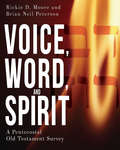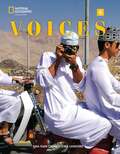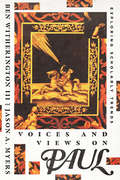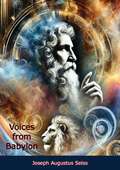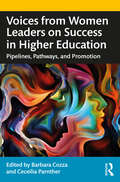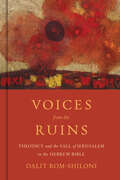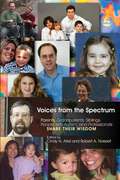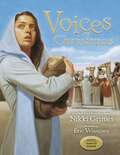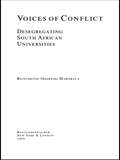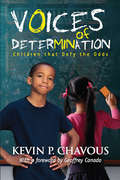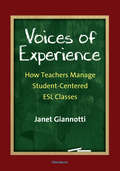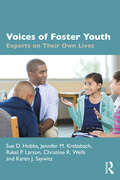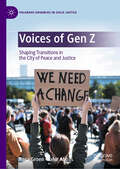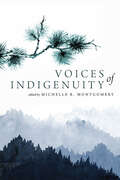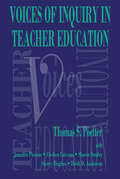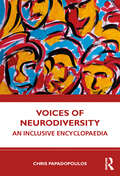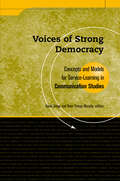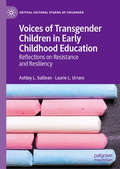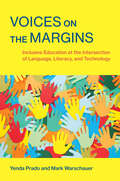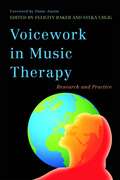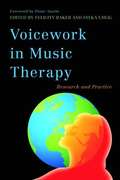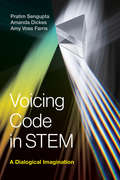- Table View
- List View
Voice, Word, and Spirit: A Pentecostal Old Testament Survey
by Brian Neil Peterson Rickie D. MoorePentecostalism is a movement that, in a little over a century, has encircled the globe and, either directly or indirectly, has impacted and influenced every quarter of Christendom. At its heart the movement bears witness to a contemporary experience of divine-human encounter in line with the prophetic claims of the Old Testament and the Pentecost testimony of the New—indeed an encounter with the power/the presence/the Spirit of God that is radically transformative enough, at both personal and corporate levels, to evoke a new way of seeing the world and, with it, a new way of reading the Word. In the post-modern situation that has forced all of us to a greater awareness of the contextual particularities of how we see and read things, with all of the limitation and the illumination that this can entail, it is time for offering a survey of Scripture, and the Old Testament in particular, that speaks both from and to the manifold global context of Pentecostal faith and practice.Here the authors are deft guides, affirming the integration of academic scholarship and charismatic spirituality. They present thoughtful readers with an overview of the Old Testament that is explicitly engaged with the faith and practice of the Pentecostal movement and the recent scholarship that has been generated by this contemporary, global, Christian movement, especially as it bears upon biblical interpretation. They invite readers to approach scripture reading with the expectation of being encountered and addressed by a Living Voice, flipping the primary goal of biblical study from ‘us interpreting Scripture’ to ‘Scripture reading and interpreting us.’ In addition to treating each Old Testament book individually, this textbook offers a brief chapter-length introduction to each of the four major book collections, as standardized in the Protestant Bible’s arrangement of Old Testament Scriptures: 1) Pentateuch; 2) Historical Books; 3) Poetical Books; and 4) Prophets.
Voices and Values: A Reader For Writers
by Janet M. Goldstein Beth JohnsonVoices and Values is suitable for reading and/or writing classes, the book provides a series of forty lively and thought-provoking essays that will compel student attention.
Voices and Views on Paul: Exploring Scholarly Trends
by Ben Witherington III Jason A. MyersIn the field of Pauline studies, much has changed over the last twenty years. Since Ben Witherington III first published his influential book The Paul Quest, monumental works have appeared from scholars such as James D. G. Dunn, N. T. Wright, E. P. Sanders, and John Barclay. The New Perspective is no longer new, and the flurry of publications continues across a range of specialized studies. Those interested in exploring trends and issues related to Paul may find themselves in need of a map. With Voices and Views on Paul, Ben Witherington and Jason Myers have teamed up to provide a reliable guide to the major terrain of Pauline scholarship. Through a distinctive combination of survey and evaluation, they explain and analyze the thought of recent major Pauline interpreters and track developments over the past two decades. They conclude with an assessment of how these studies have advanced our understanding of Paul and where further work is needed. Voices and Views on Paul offers a helpful service to students, pastors, and anyone seeking to keep up with this dynamic field as scholars continue to wrestle with Paul and his work.
Voices from Babylon: Or The Records Of Daniel The Prophet - A Biblical Commentary Of Visions And Prophecy
by Joseph Augustus SeissEmbark on an enlightening journey through the prophetic visions and profound messages of the Book of Daniel with Joseph Augustus Seiss' "Voices from Babylon: Or the Records of Daniel the Prophet - A Biblical Commentary of Visions and Prophecy." This comprehensive commentary offers a detailed and insightful exploration of one of the most intriguing books of the Bible, shedding light on its complex prophecies and their significance for both ancient and modern times.Joseph Augustus Seiss, a distinguished 19th-century theologian and biblical scholar, meticulously examines the Book of Daniel, providing readers with a clear and thorough understanding of its prophetic visions."Voices from Babylon" delves into the historical context of Daniel’s life in Babylon, exploring the cultural and political backdrop that shaped his experiences and revelations. Seiss highlights the enduring relevance of Daniel's prophecies, drawing connections between the ancient world and contemporary events, and offering insights into God's overarching plan for humanity.Seiss' commentary covers key themes such as the rise and fall of empires, the sovereignty of God, and the ultimate triumph of His kingdom. He provides a detailed examination of the prophetic symbols, including the statue in Nebuchadnezzar’s dream, the four beasts, and the seventy weeks, offering interpretations grounded in thorough biblical scholarship.Rich with theological insight and historical detail, "Voices from Babylon" is an essential read for students of prophecy, theologians, and anyone seeking a deeper understanding of the Book of Daniel. Seiss’ engaging writing style and rigorous analysis make complex prophetic themes accessible to a broad audience, encouraging readers to appreciate the depth and majesty of biblical prophecy.
Voices from Women Leaders on Success in Higher Education: Pipelines, Pathways, and Promotion
by Barbara Cozza Ceceilia ParntherThis book assists aspiring and current women leaders on how to advance into higher education leadership roles. Drawn from research and the lived experiences of women and non-binary people in higher education leadership, this book serves as a guide in understanding the gender disparity in higher education leadership and how women leaders forge pathways to promotion and success through systemic barriers, obstacles, and a lack of representation. A critical review of traditional leadership theory offers an opportunity to reimagine how effective leadership is framed and valued in higher education. Chapter authors and case studies explore the intersections of multiple identities and their impacts on leadership through lenses, including institutional type, functional areas, ability, gender identity, sexuality, race, and ethnicity. Focusing on a bridge from theory to practice that is designed to empower and inspire women leaders at all levels of the spectrum, this book is ideal reading for higher education scholars, students, and faculty aspiring to become leaders.
Voices from the Ruins: Theodicy and the Fall of Jerusalem in the Hebrew Bible
by Dalit Rom-ShiloniWhere was God in the sixth-century destruction of Jerusalem? The Hebrew Bible compositions written during and around the sixth century BCE provide an illuminating glimpse into how ancient Judeans reconciled the major qualities of God—as Lord, fierce warrior, and often harsh rather than compassionate judge—with the suffering they were experiencing at the hands of the Neo-Babylonian empire, which had brutally destroyed Judah and deported its people. Voices from the Ruins examines the biblical texts &“explicitly and directly contextualized by those catastrophic events&”—Kings, Jeremiah, Ezekiel, Lamentations, and selected Psalms—to trace the rich, diverse, and often-polemicized discourse over theodicy unfolding therein. Dalit Rom-Shiloni shows how the &“voices from the ruins&” in these texts variously justified God in the face of the rampant destruction, expressed doubt, and protested God&’s action (and inaction). Rather than trying to paper over the stark theological differences between the writings of these sixth-century historiographers, prophets, and poets, Rom-Shiloni emphasizes the dynamic of theological pluralism as a genuine characteristic of the Hebrew Bible. Through these avenues, and with her careful, discerning textual analysis, she provides readers with insight into how the sufferers of an ancient national catastrophe wrestled with the difficult question that has accompanied tragedies throughout history: Where was God?
Voices from the Spectrum: Parents, Grandparents, Siblings, People with Autism, and Professionals Share Their Wisdom
by Cindy N. Ariel Robert A. NaseefAuthor of Could It Be Autism? A Parent's Guide to the First Signs and Next Steps Voices from the Spectrum is a compelling collection of personal accounts from people on the autism spectrum and those who care for them, including professionals, friends and family members. The essays in this collection tell of both the positive and negative effects of autism on individuals and families, and pose the question: is a diagnosis on the autism spectrum a puzzle to be solved, or something to be embraced and accepted? The broad scope of this book presents insights into the autism spectrum from many different perspectives - from first-hand accounts of the autistic child's school and childhood experiences to parents' and grandparents' reactions to a diagnosis. A number of chapters written by professionals explain their motivations for working with autistic people and reveal what they have learned from their work and how it has affected their lives. The contributors describe experiences of autism from the mildest to the most severe case, and share their methods of adapting to life on the spectrum. Voices from the Spectrum will appeal to a wide readership of adults and younger people on the autism spectrum, their families and friends, as well as practitioners.
Voices of Advent Leader Guide: The Bible’s Insights for a Season of Hope
by Matthew L. SkinnerExperience Advent with the Scriptures that inspire Christmas.The Leader Guide contains discussion questions and session plans for a four-week study of Voices of Advent. It includes opening and closing prayers, optional activities, and weekly session goals. It is designed to be used with the book and DVD.In Voices of Advent, Matthew L. Skinner leads readers through biblical texts and explores how they shape our lives and Christmas celebrations. We listen as Jesus promises to return to us in the future, to John the Baptist as he prepares the way for the Messiah, to the faithful people and poets who anticipate the magnificence of Jesus’s birth, and to the angels and visionaries who praise God when Christmas dawns. Listen carefully to the Bible’s various perspectives that shape our preparations for Christmas; you’ll hear hope in all of them. Voices of Advent helps readers experience Advent not only as the start of the Christian Church Year, but also as the powerful overture that sets the tone for the incredible story of Jesus.
Voices of Advent: The Bible’s Insights for a Season of Hope
by Matthew L. SkinnerExperience Advent with the Scriptures that inspire Christmas.In Voices of Advent, Matthew L. Skinner leads readers through biblical texts and explores how they shape our lives and Christmas celebrations. We listen as Jesus promises to return to us in the future, to John the Baptist as he prepares the way for the Messiah, to the faithful people and poets who anticipate the magnificence of Jesus’s birth, and to the angels and visionaries who praise God when Christmas dawns. Listen carefully to the Bible’s various perspectives that shape our preparations for Christmas; you’ll hear hope in all of them. Voices of Advent helps readers experience Advent not only as the start of the Christian Church Year, but also as the powerful overture that sets the tone for the incredible story of Jesus.In addition to the book, other study components include a Leader Guide and video available on DVD.
Voices of Christmas
by Nikki GrimesGabriel “paced the halls of heaven” as he memorized God’s message to Mary. He wondered what she would say. The Christmas story unfolds, as never before, through the voices of those who witnessed the Messiah’s birth. Listen to Joseph’s struggle. Rejoice with Elizabeth and Zachariah. Worship with the magi. Hear the fear in Herod’s voice. Receive the blessing of Simeon and Anna. And, like the shepherds, shout for joy!
Voices of Conflict: Desegregating South African Universities (RoutledgeFalmer Studies in Higher Education)
by Reitumetse Obakeng MabokelaThe South African higher education system has historically been characterized by racial and gender inequities inherited from the discriminatory policies of the apartheid era. Emerging from a higher education history plagued with deeply entrenched racial disparities, Voices of Conflict examines how academic programs and structures at the historically white universities have responded to the increasing enrollment of black students since the enactment of the Universities Amendment Act in 1983. Dr. Mabokela specifically seeks to understand the perceptions and attitudes of students, faculty, and administrators and to determine how these respective constituents have responded to changes in student demographics. Her study brings to light, with clarity and thoroughness, many too often overlooked and neglected issues in higher education in South Africa.
Voices of Determination: Children That Defy the Odds
by Kevin ChavousVoices of Determination tells the stories of ten children who overcame extraordinarily difficult circumstances to get an education and end the cycle of generational poverty. It debunks the myth that children are victims of circumstance. In this moving work, Kevin P. Chavous argues that children can and will succeed if the educational system provides them with the opportunity to learn.Many of these narratives depict public schools at their worst. Chavous argues that poor communities routinely hire inexperienced teachers, lack resources, and pass kids along until they drop out. Once out of school, these youngsters quickly find out that they are unprepared for the job market. This, he claims, leads many young people to drift into anti-social behavior and turn to gangs, drugs, and unproductive lifestyles. In addition the narratives in this volume also address such social issues as immigration, bad neighborhoods, poor health care, addiction, and child abuse. Chavous highlights how hope for a better future enabled the children whose stories make up this volume to achieve a better life.There are potential challenges at every stage of a child's development and the adults around them need to be nearby and ready to act effectively. Chavous concludes that the need to strengthen families and to rebuild surrounding communities should be the top priorities for society as a whole.
Voices of Experience: How Teachers Manage Student-Centered ESL Classes
by Janet GiannottiThis book is a collection of strategies and tips collected through a survey of 80 practicing ESL professionals, as well as a series of conversations with the author's colleagues. The book reveals teachers' motivations for choosing certain techniques. A unique feature of the book is the thinking that underlies teachers' choices in terms of how they manage their classroom. Voices of Experience was designed and written with teachers-in-training and seasoned professionals in mind; the book would be used differently by each. The book has five units: The Classroom Environment, Lesson Planning, Pair and Group Work, Classroom Interactions, and Classroom Trouble Spots. Each unit has two or three chapters that discuss the survey responses and relevant quotes from participants. Each unit concludes with a Connections section that features: · *Challenging Beliefs: What Teachers Think, which presents a statement for readers to respond to and compare their responses to others who completed the survey. · * Classroom Connections: What Teachers Do, which lists reflection or discussion questions · * Strategies and Motivations: What Teachers Say, which presents more quotes from respondents, particularly those that look at what's behind teachers' choices. These too could be used for reflection or discussion.
Voices of Foster Youth: Experts on Their Own Lives
by Karen J. Saywitz Sue D. Hobbs Jennifer M. Krebsbach Rakel P. Larson Christine R. WellsThis important book offers unique insight into the experience of foster youth from 27 countries around the world. It provides a systematic review of literature reporting the experiences of youth in care, addressing a wide range of key topics in this multidisciplinary field, and presenting the views and perceptions of these young people.Including a meta-analysis on contact with birth parents, it examines youth’s experiences of the foster care system; contact and relationships; caregiving and relationships with caregivers; placements; and emotional well-being. These five core themes embrace a wide range of crucial topics including foster youth’s involvement in decisions about themselves; interactions with social workers, birth families, foster families, peers, and friends; the benefits and challenges of foster care; the stigma attached to being in care; mental health, well-being, and belonging; and developing a sense of self.This essential volume is for students and scholars of child and adolescent development, social work, education, sociology, and public health. Illustrated with quotes from former and current foster youth, and with research-based recommendations for best practices in foster care, it is also for professional social workers, psychologists, child advocates, children’s therapists, children’s attorneys, youth workers, and foster parents.
Voices of Gen Z: Shaping Transitions in the City of Peace and Justice (Palgrave Advances in Child Justice)
by Tahir Abbas Rosa GroenThis book provides empirical evidence on youth engagement with peace, justice, and strong institutions (SDG 16). It takes a bottom-up approach to exploring the meaning and value of global citizenship and social cohesion. It showcases three studies about how the younger generation interprets SDG 16, EU Climate policies (such as the European Green Deal) and the goals of The Hague as the International City of Peace and Justice. The city of The Hague is dedicated to the promotion of peace, justice, inclusivity and security and yet it is one of the most segregated cities in the Netherlands. This book challenges the assumptions that young people are uninterested in local decision-making or lack the competence to contribute to improving their neighborhoods. It gives voice to young people, generation Z (13-25 years old), in disadvantaged and advantaged areas in The Hague examining the experiences they have, their views in contrast with those of educators and policymakers in The Hague, and their views compared to different areas and age groups in The Hague. This book brings together multiple funded projects to discuss how we can engage young people in democratic processes including policymaking and societal challenges. It helps to bridge the gap between young people and policymakers and therefore speaks to policymakers, academics, students and lecturers on social cohesion, criminology, and social policies.
Voices of Indigenuity (Intersections in Environmental Justice)
by Michelle MontgomeryVoices of Indigenuity collects the voices of the Indigenous Speaker Series and multigenerational Indigenous peoples to introduce best practices for traditional ecological knowledge (TEK). In this edited collection, presenters from the series, both within and outside of the academy, examine the ways they have utilized TEK for inclusive teaching practices and in environmental justice efforts. Advocating for and providing an expansion of place-based Indigenized education that infuses Indigenous epistemologies for student success in both K–12 and higher education curricula, these essays explore topics such as land fragmentation, remote sensing, and outreach through the lens of TEK, demonstrating methods of fusing learning with Indigenous knowledge (IK). Contributors emphasize the need to increase the perspectives of IK within institutionalized knowledge beyond being co-opted into non-Indigenous frameworks that may be fundamentally different from Indigenous ways of thinking. Decolonizing current harmful pedagogical curricula and research training about the natural world through an Indigenous- guided approach is an essential first step to rebuilding a healthy relationship with our environment while acknowledging that all relationships come with an ethical responsibility. Voices of Indigenuity captures the complexities of exploring the contextu- alized meanings for why TEK should be integrated into Western environmental science processes and frameworks while rooted in Indigenous studies programs.
Voices of Inquiry in Teacher Education
by Thomas S. Poetter Jennifer Pierson Chelsea Caivano Shawn Stanley Sherry HughesThis book is an attempt to show that preservice teacher knowledge is substantive and should be part of the wider database of knowledge about teaching and learning in the field of teacher education. From the perspectives of five prospective teacher interns and a teacher educator, this volume brings the experiences of students conducting research during preservice teacher education to life. Charged to conduct a semester long study in the school, the intern-authors studied classroom scenes and their own work, and wrote case studies depicting their experiences. Their pieces -- in their entirety -- compose the central chapters of the book and serve as examples of preservice teacher research. The surrounding chapters examine the interns' experiences of conducting research during their preservice internship year primarily from the perspective of a teacher educator who studied them and the scene throughout the experience. The teacher educator examines the interns' approaches to research and the processes they employed to conduct and complete their studies, the interns' professional growth as a result of their participation in the study, and the impact the project had on the program. This book fills the gaps that exist in the present literature on the use of teacher research during preservice by including the inquiry works of preservice teachers as examples of legitimate, important preliminary research in their own rights, and by addressing the complex issues of conducting this type of study during preservice from multiple perspectives, not just that of the university researcher. While some texts include the perspectives of students and even include portions of students' own work, this text takes the step of co-authorship, sharing the academic discourse with intern teachers who have produced experience and knowledge that are informative for the field of education as a whole and specifically for teacher education. The text attempts to combine many voices into one thorough, narrative approach, ultimately urging the reader to consider the possibilities of teacher research for advancing knowledge in the field and for enhancing the professional development of the participants.
Voices of Neurodiversity: An Inclusive Encyclopaedia
by Chris PapadopoulosThis groundbreaking A-Z of neurodiversity provides an accessible and definitive resource for professionals, families, and anyone seeking to better understand the vast landscape of neurodiversity as well as the experiences and potential of neurodivergent people.Covering over 370 terms, the book offers a nuanced understanding of each term’s multifaceted relevance and is structured around seven key categories: Neurodivergent identities, states, and models Emotional and mental health and well-being Social interaction, communication, and relationships Advocacy, rights, and community dynamics Support and therapy Education and professional contexts Harmful, pathologising, and stigmatising concepts and practices Enriching this comprehensive reference, the book includes over 60 first-hand contributions from 12 neurodivergent individuals from across the world. Their diverse identities, lived experiences, and insights provide cross-cultural, intersectional, and deeply personal perspectives, offering powerful additional context to the definitions explored.This encyclopaedia is an essential resource for neurodivergent individuals, professionals in social care, healthcare, education, and mental health; families, policymakers, the wider public, and anyone interested in learning more about neurodiversity.
Voices of Strong Democracy: Concepts and Models for Service Learning in Communication Studies
by David Droge Bren Ortega MurphyEleventh in AAHE and Campus Compact’s series on service-learning in the disciplines, this book focuses on incorporating service-learning in communication, one of the fastest growing disciplines in higher education. The first part provides a strong argument on why service-learning should be part of the communication curriculum, while the second part dramatically demonstrates the ways in which service-learning has a natural affinity for the communication discipline.
Voices of Transgender Children in Early Childhood Education: Reflections on Resistance and Resiliency (Critical Cultural Studies of Childhood)
by Ashley L. Sullivan Laurie L. UrraroThis volume explores transgender children and internalized body normalization in early childhood education settings, steeped in critical methodologies including post-structuralism, queer theory, and feminist approaches. The book marries theory and praxis, submitting to current and future teachers a text that not only presents authentic narratives about trans children in early childhood education, but also analyzes the forces at work behind gender policing, gender segregation, and transphobic education policies. As the struggles and triumphs of trans individuals have reached a watershed moment in the social fabric of the United States, this text offers a snapshot into the lives of ten transgender people as they reflect on their earliest memories in the American educational system.
Voices on the Margins: Inclusive Education at the Intersection of Language, Literacy, and Technology
by Mark Warschauer Yenda PradoA rich view of inclusive education at the intersection of language, literacy, and technology—drawing on case study research in a diverse full-inclusion US school before, during, and after the COVID-19 pandemic.Despite advancing efforts at integration, the segregation of students with disabilities from their nondisabled peers persists. In the United States, 34 percent of all students with disabilities spend at least 20 percent of their instructional time in segregated classrooms. For students with intellectual or multiple disabilities, segregated placement soars to 80 percent. In Voices on the Margins, Yenda Prado and Mark Warschauer provide an ethnography of an extraordinary full-inclusion public charter school in the western United States—Future Visions Academy. And they ask: What does it mean to be inclusive in today&’s schools with their increasingly pervasive use of digital technologies?Voices on the Margins examines the ways digital technologies support inclusion and language and literacy practices for culturally and linguistically diverse children with and without disabilities. A wide range of qualitative data collected in the case study illuminates three central themes: (1) the kinds of social organization that allow a fully inclusive environment for children with disabilities to thrive, (2) the ways that digital technologies can be used to help students express their voice and agency, while developing language and literacy skills, and (3) the ways that digital technologies can be used to foster stronger networks and connections between students, teachers, staff, and parents.
Voicework in Music Therapy
by Sylka Uhlig Edited by Felicity BakerThe voice is a powerful instrument in music therapy practice and this anthology of voicework techniques explores everything the practitioner and researcher needs to know in order to bring about successful vocal interventions across a broad range of client groups. Compiling a wealth of international evidence-based practice, this book offers detailed descriptions of clinical methods that are grounded in research. Chapters are grouped into structured and unstructured approaches for use with clients of all ages. Clinical populations covered include neonates, children with autism or developmental disability, individuals with neurological damage including stroke, Parkinson's disease patients, traumatic brain injury, and spinal injury, people with mental illness, medical conditions such as asthma and pain, oncology and palliative care, aged care and dementia. This book will be an invaluable resource for any music therapy student, practitioner or researcher looking to explore the use of voicework in music therapy.
Voicework in Music Therapy: Research and Practice
by Diane Austin Felicity Baker Sylka UhligThe authors bring together 16 chapters by a group of music therapy voicework specialists from North America, Europe, Asia, and Australia who describe to music therapy students, practitioners, and researchers voicework techniques for clients of all ages. They explain structured and free approaches to voicework with autistic and at-risk children; adults who were told as children they could not sing; newborns; individuals with emotional trauma, dementia, spinal cord injury, traumatic brain injury, neurological damage, Parkinson's disease, and aphasia or apraxia; and those in hospice or palliative care. Annotation ©2012 Book News, Inc. , Portland, OR (booknews. com)
Voicing Code in STEM: A Dialogical Imagination
by Pratim Sengupta Amanda Dickes Amy Voss FarrisAn exploration of coding that investigates the interplay between computational abstractions and the fundamentally interpretive nature of human experience.The importance of coding in K-12 classrooms has been taken up by both scholars and educators. Voicing Code in STEM offers a new way to think about coding in the classroom--one that goes beyond device-level engagement to consider the interplay between computational abstractions and the fundamentally interpretive nature of human experience. Building on Mikhail Bakhtin's notions of heterogeneity and heteroglossia, the authors explain how STEM coding can be understood as voicing computational utterances, rather than a technocentric framing of building computational artifacts. Empirical chapters illustrate this theoretical stance by investigating different framings of coding as voicing.
